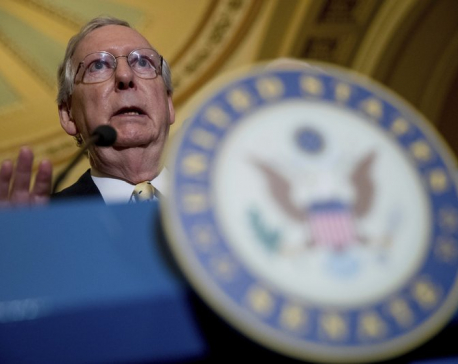
OR
Amending constitution
The ruling parties, chiefly CPN (Maoist Center) and Nepali Congress, have to either categorically say that there is no need to amend the new constitution, which, after all, was endorsed by an overwhelming majority of the sovereign Constituent Assembly. Or they have to talk to the protesting parties and amend the constitution at the earliest. But the government of Pushpa Kamal Dahal does not seem ready to forthrightly pursue either of these two paths. The prime minister has repeatedly expressed his commitment to amend the constitution and accommodate dissenting voices. Before leaving for the BRICS-BIMSTEC summit in Goa also he had promised amendments as soon as he returned. But the reality is that there has been no serious dialogue between the two sides since the formation of Dahal government two and a half months ago. Lest we forget, the one and only stated reason for the ouster of the previous Oli government, and Oli’s replacement by Dahal, was that the CPN-UML chairman was supposedly not serious about settling outstanding constitutional issues. But based on the evidence so far it’s hard to see how the Dahal government is in any way better on this front.
It appears that the ruling parities believe that the voices of protest will die down with the passage of time. They won’t. In fact, the longer it takes to amend the constitution, the harder it will be to placate the clamoring masses. It would be dangerous to reach a point where just about any amendment is rejected, not just by the protesting parties but also by sizable chunks of the population. This, however, does not mean that the statute should be amended strictly along the lines prescribed by the various Madheshi and Janajati outfits. For instance we believe that the federal states covering the hilly and mountainous areas deserve at least one entry-point into India. This will greatly reassure those who fear that the idea of Madhesh-only provinces is a ploy to destroy their livelihoods, sustained in part by the free movement of people and goods across the porous Indo-Nepal border. It will also dilute the appeal of the fear-mongers who would have us believe that such east-west demarcations will eventually lead to secession. We are also in favor of electing the upper house with near equal representatives from each federal province, even while the lower house is elected strictly on population basis. This will ensure that the voices of the less populated western and far-western regions are not completely neglected.
All successful negotiations involve trade-offs, where you give up something valuable to gain something even more valuable. We are afraid that the protesting Madheshi parties have also been needlessly rigid, which is one reason there has so far been no headway in talks over the constitution. For example, even before sitting down for talks, they insist that there be two Madhesh-only provinces spanning the length of the country. They ought to be more flexible if they want viable settlements. The real danger of this dilly-dallying, as this newspaper has repeatedly pointed out, is that extremist forces on both the sides could slowly wrest the initiative from the mainstream political actors. Recent-day murmurs of the revival of the Hindu state and an independent Madhesh must be seen in this context. As one Donald Trump has so tragically shown in the US, even seemingly sane folks are ready to accept blatant lies if there is someone to spout them with conviction.
You May Like This

Anushka reveals why she doesn't talk much about herself
MUMBAI, Oct 5: While many B-town stars stay in the headlines by talking about themselves on various platforms, actress Anushka Sharma... Read More...

5 reasons why health care bill would fail, 3 why it may not
WASHINGTON, July 24: There are many reasons why the Senate will probably reject Republicans’ crowning bill razing much of former President... Read More...

Why FDI?
With the paucity of economic resources and our weak technical know how, we have no option but to attract FDI... Read More...



Just In
- World Malaria Day: Foreign returnees more susceptible to the vector-borne disease
- MoEST seeks EC’s help in identifying teachers linked to political parties
- 70 community and national forests affected by fire in Parbat till Wednesday
- NEPSE loses 3.24 points, while daily turnover inclines to Rs 2.36 billion
- Pak Embassy awards scholarships to 180 Nepali students
- President Paudel approves mobilization of army personnel for by-elections security
- Bhajang and Ilam by-elections: 69 polling stations classified as ‘highly sensitive’
- Karnali CM Kandel secures vote of confidence















Leave A Comment